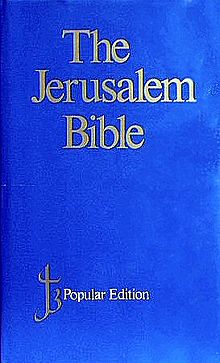
Back Jeruzalémská bible Czech Jerusalemer Bibel German Biblio de Jerusalemo Esperanto Biblia de Jerusalén Spanish Bible de Jérusalem French ביבליית ירושלים HE Alkitab Yerusalem ID Bibbia di Gerusalemme Italian エルサレム聖書 Japanese 예루살렘 성경 Korean
| The Jerusalem Bible | |
|---|---|
 | |
| Full name | The Jerusalem Bible |
| Abbreviation | JB or TJB |
| Complete Bible published | 1966 |
| Textual basis | Old Testament: La Bible de Jérusalem, Masoretic text with strong Septuagint (especially in Psalms) and some Vulgate influence. New Testament: La Bible de Jérusalem, Eclectic text with high correspondence to the Nestle-Aland Novum Testamentum Graece with major variant readings from the Majority text and sacred tradition (i.e. Comma Johanneum and the longer ending of Mark) incorporated or noted. Deuterocanon: Septuagint with Vulgate influence. |
| Translation type | Dynamic equivalence |
| Copyright | 1966, 1967 and 1968 by Darton, Longman & Todd Ltd and Doubleday and Co. Inc. |
| Webpage | www |
In the beginning God created the heavens and the earth. Now the earth was a formless void, there was darkness over the deep, and God's spirit hovered over the water. God said, 'Let there be light', and there was light.
Yes, God loved the world so much that he gave his only Son, so that everyone who believes in him may not be lost but may have eternal life. | |
The Jerusalem Bible (JB or TJB) is an English translation of the Bible published in 1966 by Darton, Longman & Todd. As a Catholic Bible, it includes 73 books: the 39 books shared with the Hebrew Bible, along with the seven deuterocanonical books, as the Old Testament, and the 27 books shared by all Christians as the New Testament. It also contains copious footnotes and introductions.
For roughly half a century, the Jerusalem Bible has been the basis of the lectionary for Mass used in Catholic worship throughout much of the English-speaking world outside of North America, though in recent years various bishops' conferences have begun to transition to newer translations, including the English Standard Version, Catholic Edition, in the United Kingdom and India[1] and the Revised New Jerusalem Bible in Australia, New Zealand, and Ireland.[2]
- ^ "The New Lectionary for England and Wales". www.liturgyoffice.org. 2021-01-22. Retrieved 2021-11-03.
- ^ "New Zealand helps with new lectionary project". www.cathnews.co.nz. 2021-05-10. Retrieved 2021-11-03.